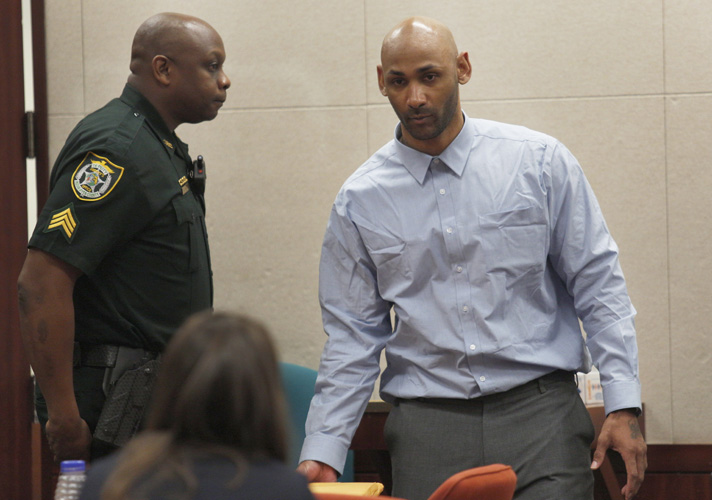
Photo by Kaila Jones
In the retrial of accused murderer Henry Lee Jones, defense attorneys relentlessly hammered away at the credibility of key prosecution witnesses, attempting to portray them as racially prejudiced.
Their efforts in the trial – which was expected to end late this week – prompted some cringe-worthy testimony that raised the eyebrows of some jurors, caused others to shift uncomfortably in their chairs, and at one point prompted a visibly frustrated Chief Assistant State Attorney Thomas Bakkendahl to clap his hand over his forehead.
One of the most awkward moments occurred when William F. Schabot testified seeing a “suspicious black man riding a bicycle” past his home on the evening of Nov. 17, 2011 – around the time victim Brian Simpson was murdered.
“Let me get this right; you see a black man riding a bicycle and thought it was suspicious?” asked Assistant Public Defender Brett Peters. “Would you have thought it was suspicious if it had been a white woman on that bike?”
“Well, yes, if I thought she was riding aimlessly,” Schabot responded, after fumbling his words several times. “I had never seen anything like it.
“It’s very rare to see a black person in that area at that time. They were riding their bike back and forth down the street. I went inside the house and told my son, ‘That’s a look-out person.’”
When Peters asked if Schabot was concerned that his comments could be perceived as prejudiced, Schabot responded: “No. I didn’t call police because I didn’t want it to be a Trayvon Martin.”
Martin was an African-American teen who was followed, shot and killed by George Zimmerman, a neighborhood watchman in Sanford, Florida.
Jones is accused of killing Simpson during a 2011 burglary at his Central Beach home. He was convicted of first-degree murder in 2014 and received a life sentence. According to testimony at his first trial, Jones shot Simpson after he and an associate were surprised inside the home.
But Jones, now 30, was granted a second trial in 2017 after the Fourth District Court of Appeals overturned his conviction. Justices decided a new trial was warranted because Jones’ public defender had not been allowed to question potential jurors about racial prejudice or bias. Jones is African-American, Simpson white.
This time the court allowed Jones to include eight race-related questions in a questionnaire that was mailed to potential jurors in advance. Thirteen potential jurors, who acknowledged bias, were immediately dismissed during the first day of selection.
Jones’ attorneys frequently used the issue of race both before and during the trial to challenge witnesses and, at one point, even the prosecutor.
Bakkendahl was accused of “blatant racism” during jury selection when he attempted to prevent the last African-American in the jury pool from sitting on the panel.
Assistant Public Defender Dorothy Naumann angrily hurled the accusation after Bakkendahl questioned the black juror’s intelligence, calling her “intellectually challenged,” and noting she was employed as a sales clerk at Wal-Mart.
“I think it’s inappropriate to suggest I have some evil intentions, to prevent African-Americans from serving on the jury,” Bakkendahl responded during a heated exchange with Naumann. After acknowledging his words were “poorly chosen,” Bakkendahl agreed to add the African-American woman to the jury.
Bakkendahl and Assistant State Attorney, Stephen Gosnell, scored several key victories during the trial. Naumann’s challenge to prevent Bakkendahl from showing jurors explicit photos of Simpson’s wounds was overruled by Circuit Court Judge Daniel Vaughn.
And Assistant Public Defender Alan Hunt attempted, but didn’t have much luck, challenging testimony on the trajectory of the bullets that killed Simpson.
The defense also failed to put a dent in testimony given by Darius Robinson, Jones’ accomplice, who was sentenced to 10 years in prison after accepting a plea deal in exchange for testifying against Jones.
Naumann unsuccessfully attempted to have Robinson’s testimony dismissed by introducing an audio snippet of what sounded like Robinson talking to a family member about a possible alibi after his arrest. Naumann argued that what Robinson said on the audio contradicted his testimony at the retrial.
But Bakkendahl argued that Robinson has repeatedly admitted initially giving false statements to police after his arrest, making the defense’s accusation moot. Vaughn agreed, and overruled Naumann’s dismissal request.



